Meet The Team: Florian Kemmerich
- Jun 18, 2025
- 10 min read
Wednesday, 18th June 2025
By Paula Perrelli dos Anjos
Florian Kemmerich is far from your typical business advisor and no ordinary impact investor. A global citizen whose journey reads like a roadmap for reconciling purpose with profit, Florian’s remarkable path spans from his formative years in Germany, where he first showed his talent in judo, to the boardrooms of the many companies with which he has collaborated. With a Latin heart trapped in a European body, he embodies an extraordinary blend of resilience, audacity, and empathy. Now, the author of the upcoming book On Vocation: How to Align Your Purpose with Your Profession, Florian reveals how he transformed painful lessons into powerful strategies that turn personal mission into a professional reality. Join us on this fascinating quest into his ideas in the third part of our "Meet The Team" series. By now, you'll agree that Amazonia Impact Ventures (AIV) is fortunate to have such exceptional advisors on its board. My online conversation with Florian took place just after he had closed a major contract for his company on a Friday afternoon, certainly an inspiring prelude to the insights he shares today.
By Paula Perrelli dos Anjos
Can you tell me a little about your day? I like to start our conversation from where you are today.
I'm at home in Geneva, a welcome change from constant travel. I've lived in Switzerland for 10 years, though I'm originally from the Black Forest, the southern part of Germany, but I haven't lived there for a long time. At home, we speak Spanish, it is a Mexican home in Geneva because my wife is Mexican. I have five kids, the eldest is 26, then 24, 22, and then twins of 16. My kids were born between the two continents: the eldest in Mexico, two in Germany, and the last two in Mexico again. I feel my origins are in the Black Forest, although I left at 22, and now I'm 55. So, in a way, we have jointly chosen our roots.
The many places you've lived and the different cultures you've experienced. How do you see that mix shaping who you are today?
If you ask my friends, they'll say I have a Latin heart trapped in a European body. We have a home in Cancun and a home in Geneva. At home, we speak Spanish, my youngest kids speak French amongst themselves, and I speak four languages every day. I even dream in different languages, it goes back and forth.
When you change a language, you change a bit of your character because you adjust to the culture. I have a big affinity for Latin countries because they're fun, joyful, and have big hearts. Switzerland is nice. Geneva is beautiful, very international, but sometimes a bit boring. Everything's clean, everything works, and everything's stable.
I read about your background, and some interesting facts made you who you are today. Can you share with us a little of your upbringing?
In primary school, I used to get bullied and once beaten. So, my parents put me in judo lessons to toughen me up. I went all the way with it. I was in a small village with judo classes, and I went on to become a winning champion, a national player. I took judo very seriously: I competed in the Bundesliga, made the national team, became a European champion, and was even prepared for the Olympics with my 3rd dan grade. But you can’t make a living with that. I decided to stop because I couldn’t see myself going to the Olympics and then ending up owning a dojo. That wasn’t my dream, I did it originally just to protect myself.
Professionally, I wanted to become a stand-up comedian. I love music; I still play music, I love entertaining stuff, and I even wanted to study dramatic arts. But my father said, 'Why don’t you study something normal first? There are a lot of artists not making a living, and you can still do art later.' So, I studied something normal and stuck with it.
What was the norm?
Business administration and international marketing. That’s why, after that, I joined a healthcare group and worked my way up, and that's also where I lived twice in Latin America. I ended up as vice president of the healthcare group for Latin America.
How did your career follow up from your studies?
At the age of 33, I had all I dreamt of: I was the managing director of a company, I had a family and a home, and so I was “successful”. But I felt a void. I kept asking myself: 'What next?' My life wasn't the life I wanted to live. So, I began personal development, exploring different methodologies, and I changed jobs, from a ‘hired-gun job' in an executive position with golden handcuffs to the rough, rollercoaster life of an entrepreneur. At that moment I discovered I have been actually the 'absent person' in my own education. I learned about everything else except how I function emotionally, mentally, and instinctively. My life had been entirely empirical, reacting to whatever bumped me up. I was chasing what society defined as success, in the hamster wheel, rather than following my own path. That was my epiphany.
Thereafter, I pivoted gradually into what I do today. There was also a moment in the jungle in Mexico, in Sierra Lacandona (Chiapas), where we sponsored an extramural surgery program treating Indigenous people. We were donating the materials, but I got invited to join the trip, and slept for 10 days in a tent and worked as a kind of scrub nurse there. I remember this little child with a cleft lip who, after the surgery and us leaving, died because there was no medicine to treat an infection. I had felt great because I was helping, when in fact, helping in that way takes away the dignity. People want to be given a chance to help themselves and not stay dependent.
Is that how Impact Investing entered your life?
When I moved to Switzerland, I learned about impact investing and thought, 'Oh, wow. Finally, capital as a force for good.' We should have done that in the jungle, not just providing healthcare delivery and then leaving, but invest in healthcare sustainability instead’. So, I decided to go into impact investing.
I joined Bamboo Capital, as an asset manager, and a very difficult turnaround, especially through the Covid pandemic. We did a lot of meaningful work with blended finance on UN, and World Bank mandates. After exiting the company, last year, I moved out to join another firm on a turnaround of a really meaningful impact advisory business. Now, it is called Human Planet (formerly KOIS Advisory) and the result of a management buyout.
Your journey in search of yourself is coming out now in July in the form of a book. Can you tell me what is happening and what this book is about?
For many years, people have asked me how to do impact investing, or how to create impact professionally. That is why I developed 7 steps to help countless seasoned entrepreneurs and younger generations discover their vocation and understand their superpower, which is their educated skill, and match these together so that your purpose becomes your profession.
Many of them asked me to write those steps down, to transform the content in a book. And then I replied, ‘Oh, I've never written a book.’ But then I began writing it aside, and in November 2024 I read a book called From Strength to Strength by Arthur Brooks, it’s about the peak performance in the second half of your life. When I read that, I said, ‘Okay, I need to try to create this book.’ I concentrated, finished it in January this year, and reached out to my editorial of choice: Routledge.
Then, everything went really fast from the book proposal, editing and approval to now seeing my book being published in July. I wrote everything alone. The title is: On Vocation: How to Align Your Purpose with Your Profession. I am now starting to do some academic and teaching things around the book, really cool stuff.
Can you detail for us a little of these steps, I am sure people who are reading this interview would be pleased to learn more from you.
Education is not vocational. Life is empirical, and success is only material. I dream that younger people could use personal development methodologies to learn about themselves still in school. My book has three sections.
The first tells my roller coaster life, my pains, and how I ended up doing what I do today. The second part is where I invented a new verb: ‘to vocate.’ To vocate means to dedicate yourself to your vocation professionally: to do something with it. And explain some of the ‘science of vocating.’ The book provides examples of well-established methods for people to study themselves, and learn how they function emotionally, mentally, and instinctively because it gives you the information you need to decide what you want to do with your life.
And finally, once you find your vocation, you match it with your superpower. For example, my superpower is to increase the perceived value of brands and products, which leads to more sales, more partners, and more money. And my vocation is to “impact lives and share profits”. I want to inspire people to do more than just have a job.
Do you think you are vocating now?
Oh yeah. Again, it is sometimes painful. Vocating isn't a goal, it is the way. I'm on the quest to touch as many lives as I can. To impact lives and to share profits as much as I can. I could do other things to make more money, and have an easier life, because what I do is very often stressful for my loved ones, since I put myself at risk because I have this quest. But again, the greater good is so much better that I don't even mind the pains I go through, they're less important because life is too short.
To stay on course, I practice meditation regularly. I do this to stay grounded, filter out the noise and turn inside, which is important for you to understand because vocation is not something which is there. In order to vocate, you have to sometimes adjust things and change over time. Even though you might be afraid, might be anxious, and you might be stressed. It is all worth it.
So how did you come across Amazonia Impact Ventures (AIV) for the first time?
I've now been involved in impact investing for over a decade, and as a result, I've invested in or financed over 100 companies, including AIV. In addition, I have been very active in YPO (Young Presidents’ Organization), where I had the pleasure of meeting Pajani (Singah, AIV’s Co-Founder). He told me about his pivot from the mainstream financial market to impact investing, and he shared his dream that was the reason for creating AIV and asked me if I could help with fundraising and impact in emerging markets.
So what could you say that interests you about AIV’s work, and what motivates you to be part of the board of advisors?
I love the mission and impact investing that AIV does. They go rural, supporting Indigenous Peoples, and they do debt investment. It brings me back to my time when I created the foundation in Mexico, and our extramural surgery program, or a few weeks ago when we were in Suriname. I have a high affinity for what AIV does, and its focus on funding indigenous and smallholder farmers in the Amazon, and that's why I'm really happy to support it.
To do impact investing, you have two things: the intentionality of capital and the additionality of capital. You have to have financial returns because this is part of the intentionality. And have to be able to take the money where others wouldn't go because it's that's the additionality.
You've been saying to businesses how the younger generations are reshaping buying culture. What key changes do you believe companies need to implement in their community approach to continue to be relevant?
This is not just about the generation, but also amplified by technology. These youngsters are born with a connected device in their hands, and with the AI’s arrival, it's even more exponential. Skill sets change, the way we buy changes, and the way we value things changes. And our attention span is shorter and shorter. In the past, we didn’t worry about harming the world or climate change.
Younger generations have much more information through their devices, and for them, it is not about making money (they will make money anyway), it is about what they do. The cause (impact) is more important than the means (money). It doesn’t mean that they're not material, they're also material, but they want to resolve things they're worried about. You have to remember that any money we spend – whether on a product or an investment - is an emotional decision on perceived value.
Younger generations, however, want to spend on things that resolve something for the greater good. This wasn’t what we followed in my generation. We were educated to secure a well-paid job and accumulate enough wealth so that we could retire decently. Now, youngsters are more worried about not being able to survive because the planet is affected. They want to resolve something with their work, which is fundamentally different.
How the Impact Finance market should respond to that?
Hence, companies need to make sure they are a force for good based on a greater cause because otherwise, employees won’t stay just because they are paying a good salary, they’ll move on or won’t be interested. You need more than delivering products. If your team can deliver causes then the net-promoter-score (NPS) of all stakeholders with increase significantly.
Here you have two ways to influence markets: by investing or consuming, and if your consumers and future investors want to support a cause, you need to respond to that. That is a fundamental shift, and it wasn’t important 30 years ago. Nowadays, sustainability isn’t nice to have, it's just part of good citizenship. So, if your company harms the planet and harms people, you will be less and less profitable.
I also believe that technology is virally fostering entrepreneurship. You can work across countries, create anywhere, and distribute your product or service to anyone. I love the idea of digital nomads and this community is creating vibrant startups in the emerging markets, and even in formerly remote areas like Africa and Latin America.
Instant Insights:
Favourite quote: “True vocation empowers not just you, but generations.”
Favourite band: Coldplay.
Favourite film: What the “Bleep” Do We Know?
Travel Bucketlist: Sailing again around the Mediterranean Islands.
Hobby: Playing music, playing golf with my wife, and making a difference.
Favourite food: Chilaquiles.
Favourite drink: Wine.
#GlobalInfluence #ImpactInvestment #LifeJourney #NewBook #CareerPurpose #BoardAdvisor #SustainableImpact #YPO #PowerOfNetwork #GlobalEntrepreneurship #PersonalDevelopment #VocationDiscovery #TransformationStory




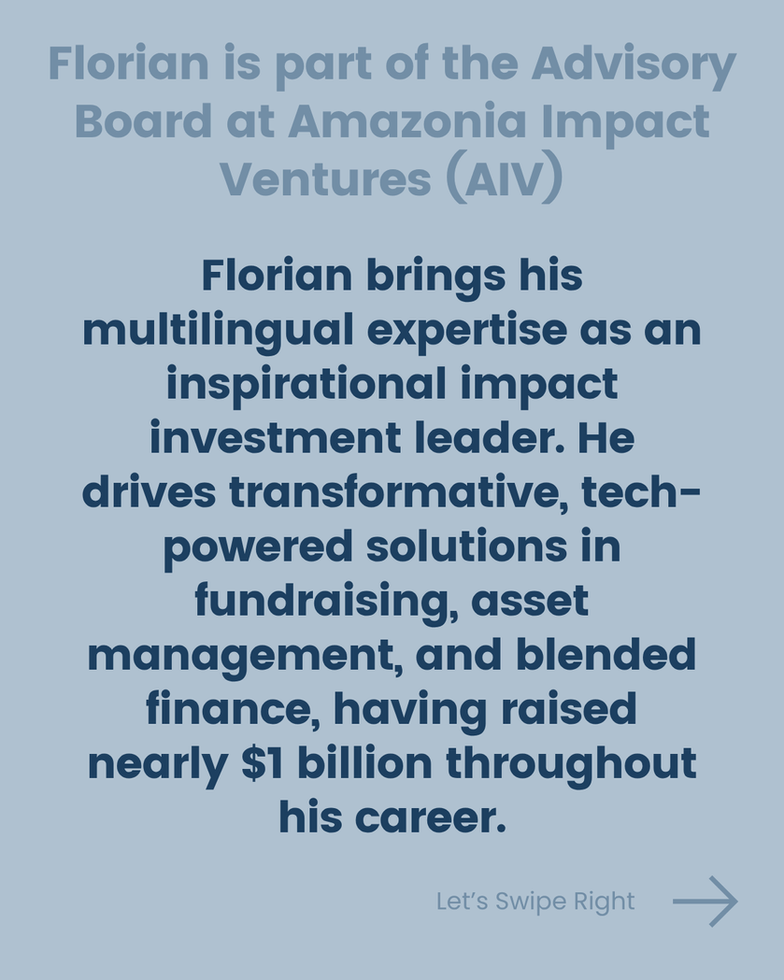















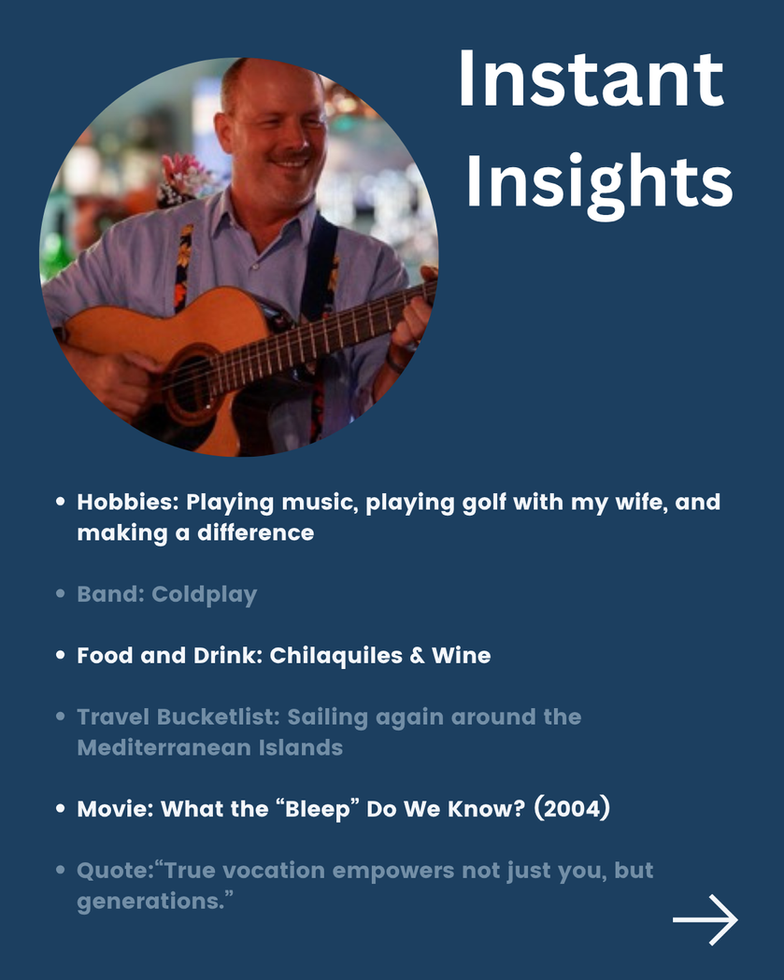

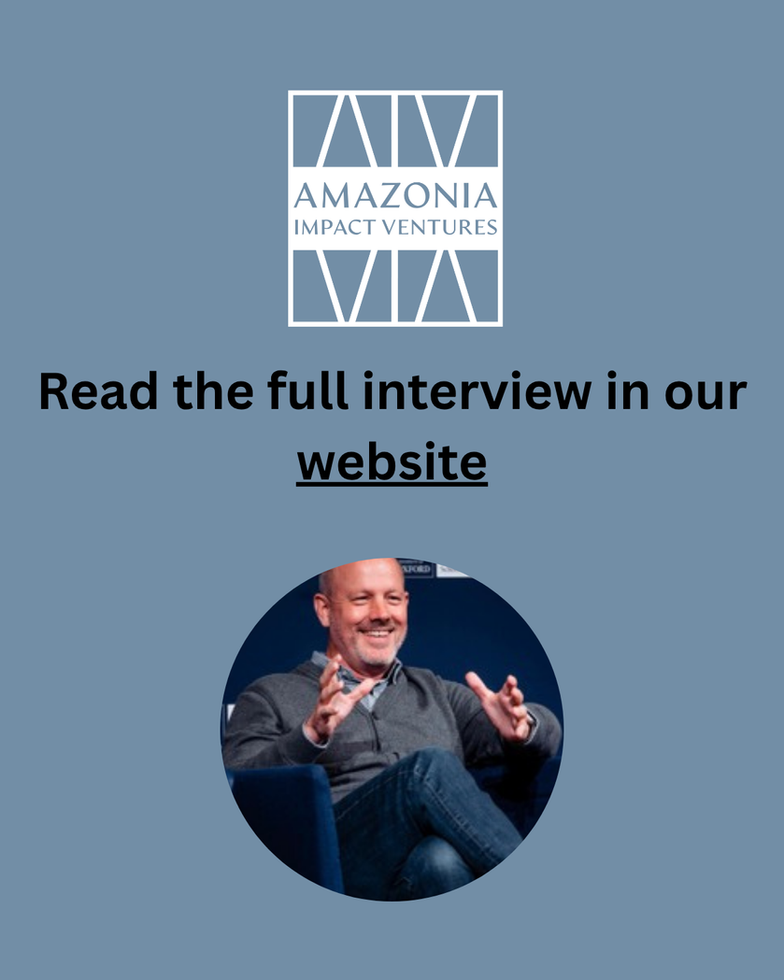
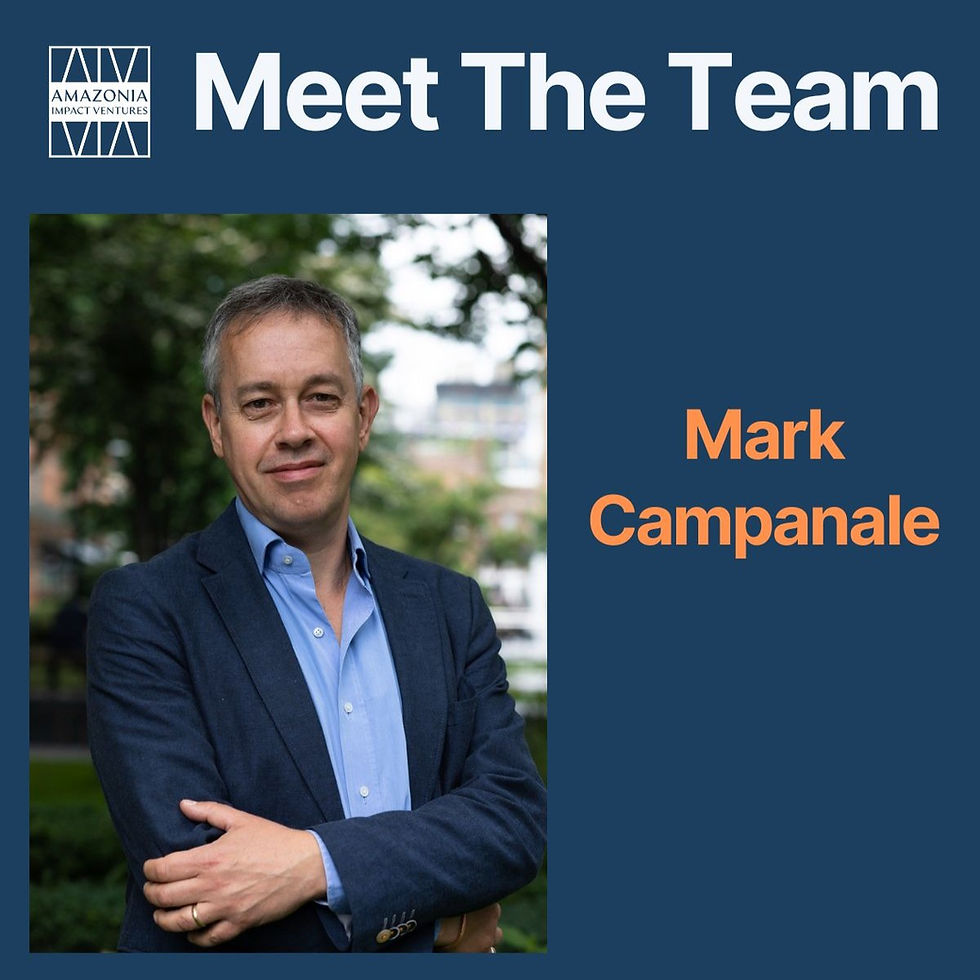
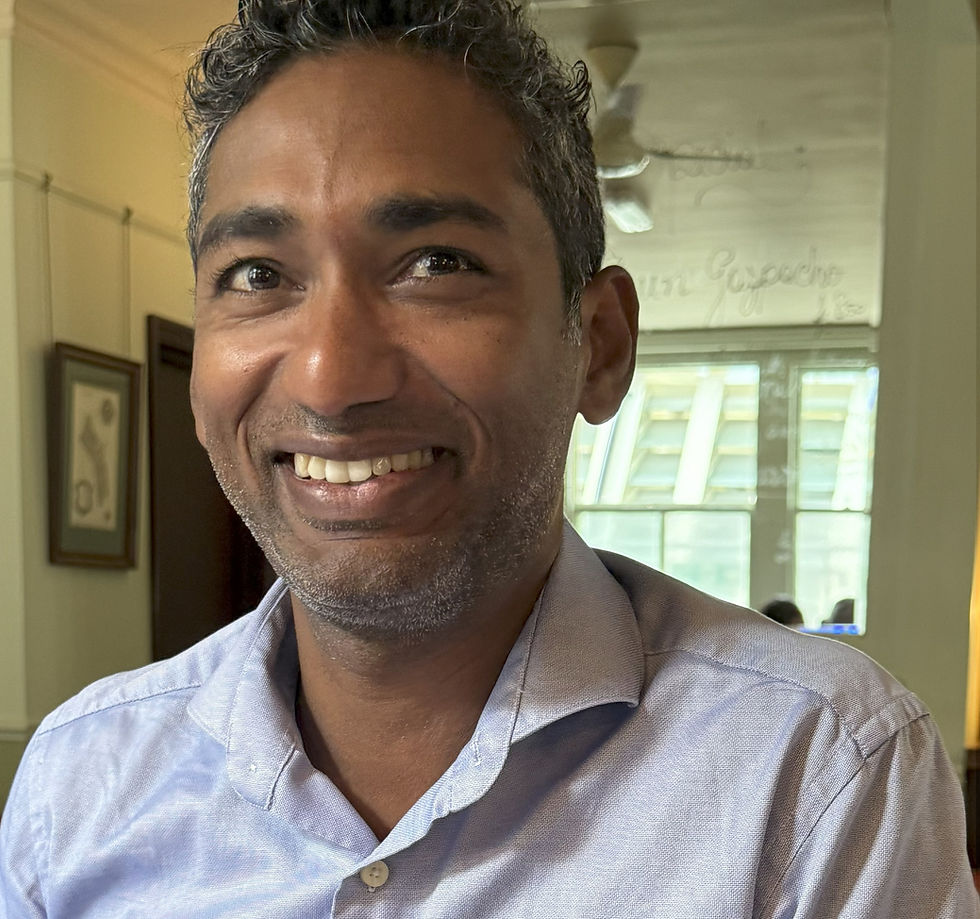

Comments